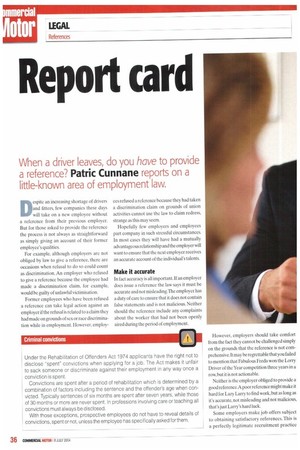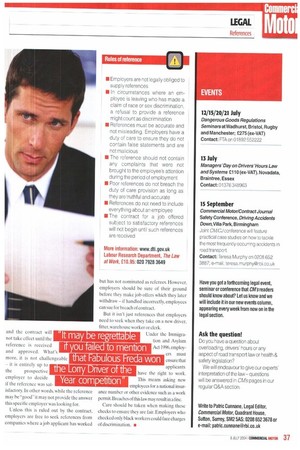Report card
Page 36

Page 37

If you've noticed an error in this article please click here to report it so we can fix it.
When a driver leaves, do you have to provide a reference? Patric Cunnane reports on a little-known area of employment law.
Despite an increasing shortage of drivers and fitters, few companies these days will take on a new employee without a reference from their previous employer. But for those asked to provide the reference the process is not always as straightforward as simply giving an account of their former employee's qualities.
For example, although employers are not obliged by law to give a reference, there are occasions when refusal to do so could count as discrimination. An employer who refused to give a reference because the employee had made a discrimination claim, for example, would he guilty of unlawful victimisation.
Former employees who have been refused a reference can take legal action against an employer if the refusal is related to a claim they had made on grounds of sex or race discrimination while in employment. However, employ ees refused a reference because they had taken a discrimination claim on grounds of union activities cannot use the law to claim redress, strange as this may seem.
Hopefully few employers and employees part company in such stressful circumstances. In most cases they will have had a mutually advantageous relationship and the employer will want to ensure that the next employer receives an accurate account of the individual's talents.
Make it accurate
In lad accuracy is all important. If an employer does issue a reference the law says it must be accurate and not misleading.The employer has a duty of care to ensure that it does not contain false statements and is not malicious. Neither should the reference include any complaints about the worker that had not been openly aired during the period of employment. However, employers should take comfort from the fact they cannot be challenged simply on the grounds that the reference is not comprehensive. It may be regrettable that you failed to mention that Fabulous Freda won the Lorry Driver of the Year competition three years in a row, but it is not actionable.
Neither is the employer obliged to provide a good reference.A poor reference might make it hard for Lazy Larry to find work, but as long as it's accurate, not misleading and not malicious, that's just Larry's hard luck.
Some employers make job offers subject to obtaining satisfactory references. This is a perfectly legitimate recruitment practice and the contract will not take effect until the reference is received and approved. What's more, it is not challengeable it is entirely up to the prospective employer to decide if the reference was satisfactory. In other words, while the reference may be "good" it may not provide the answer this specific employer was looking for.
Unless this is ruled out by the contract, employers are free to seek references from companies where a job applicant has worked
Year competition
but has not nominated as referees. However, employers should be sure of their ground before they make job offers which they later withdraw if handled incorrectly, employees can sue for breach of contract.
But it isn't just references that employers need to seek when they take on a new driver, fitter, warehouse worker or clerk.
Under the Immigration and Asylum Act 1996, employers must ensure that applicants have the right to work. This means asking new employees for a national insurance number or other evidence such as a work permit.Breaches of this law may result in a line.
Care should be taken when making these checks to ensure they are fair. Employers who checked only black workers could face charges of discrimination. •




























































































































































































